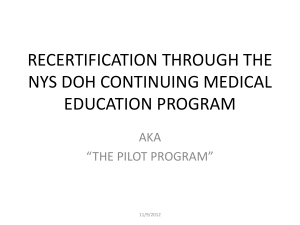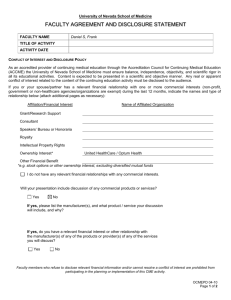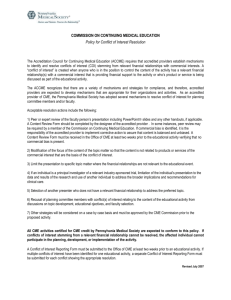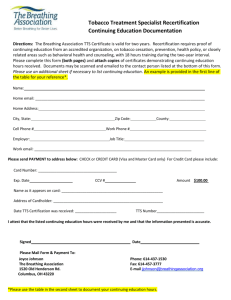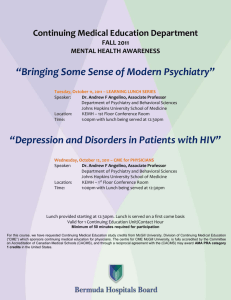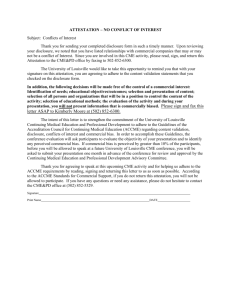CME-Based ("Pilot") Program Agency Plan Template
advertisement
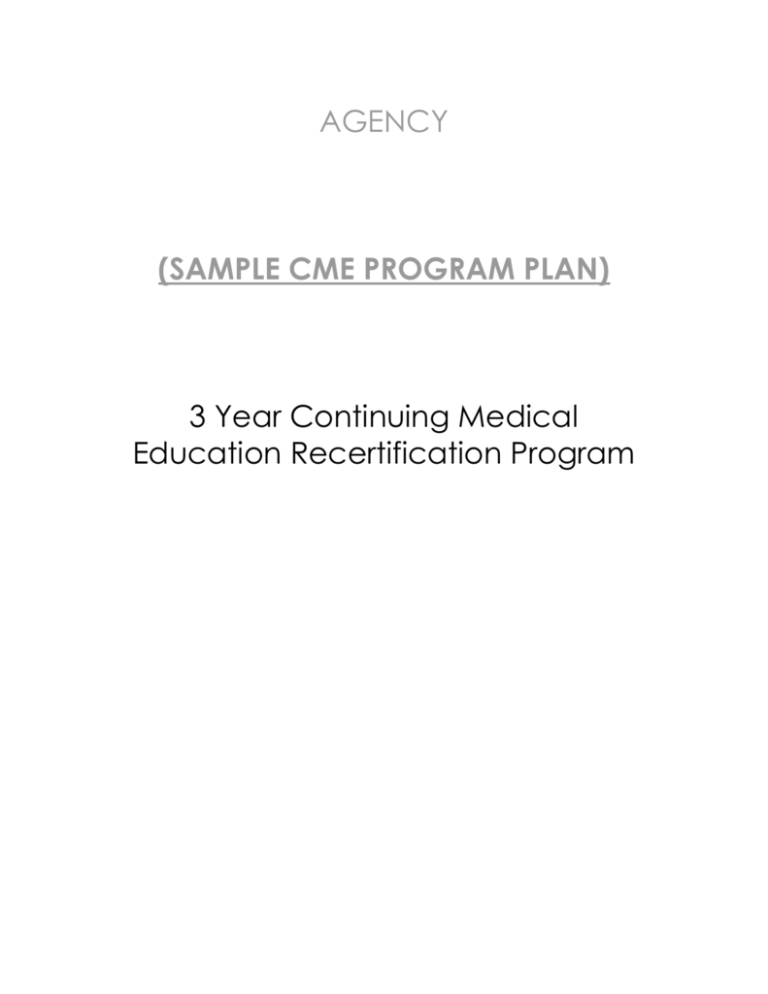
AGENCY (SAMPLE CME PROGRAM PLAN) 3 Year Continuing Medical Education Recertification Program Training and Education Coordinator (TEC) The Training and Education Coordinator (TEC) will be appointed annually by the Captain and shall have charge of continuous training, will be directly responsible to the Captain for the proper and efficient operation of the training program for his/her assigned duties. Qualifications: Emergency Medical Technician – Critical Care or Paramedic Instructor in CPR, ACLS, PALS and BTLS/PHTLS preferred Minimum 2 years in EMS, preferable at the ALS or BLS Level Supervisory experience Knowledge of State and Local Laws and Regulations governing EMS Excellent verbal/written communication skills Maintains EMT,AEMT-CC/P, ACLS, CPR certifications NYS Course Instructor Coordinator (CIC) preferred General Duties include but are not limited to: Verify Current Certifications of those participating in the Program Monitor completion of required training Notify members lacking requirements and of approaching deadlines Monitor time-lines to complete requirements Verify completion of the Program and submission of renewal application Verify re-certification The TEC, with assistance from the Service Medical Director, shall be responsible for the planning, implementation and direction of a training program for EMT’s of all levels and maintaining a written record of such training and a written record of Remediation for remedial training. With the assistance of the Medical Director, as required by NYS DOH, the TEC shall be responsible for the planning, implementation and maintenance of a Quality Assurance/Improvement Program for medical care provided by (Agency) in consultation with the Medical Director. The TEC shall be responsible for providing a program sufficient to maintain CME’s for EMS members and will coordinate and document member participation. NYS Certified Instructor Coordinators (CIC) Currently the (Agency) has within its membership the following New York State Certified Instructors: Name-Level Basic Life Support Classes Name-Level Advanced Life Support Classes It is our intention to utilize additional CIC’s throughout the region on an “as needed” basis upon verification of their Instructor Credentials. NYS Certified Lab Instructors (CLI) Currently the (Agency)MS has within its membership the following New York State Certified Lab Instructors: Name-Level Name- Level Basic Life Support Classes Advanced Life Support Classes It is our intention to utilize additional CLI’s throughout the region on an “as needed” basis upon verification of their Instructor Credentials. Course Break down: EMT-Basic Core Content 24 hours of Refresher Training (review of core content) o Preparatory (1) o Airway (2) o Patient Assessment (3) o Medical/Behavioral (8) General Pharmacology/Respiratory/Cardiac (4) Diabetes/Altered Mental Status/Allergies (2) Poisoning/Environmental/Behavioral (2) o Trauma (4) o Obstetrics/Gynecology (2) o Infants and Children (2) o Elective (2) All core content must be overseen by a CIC credentialed at the Basic EMT Level or above without exception. Continuing Medical Education 48 hours of additional continuing education requirements, which must include: o Geriatrics (minimum of 3 hours) o WMD/Terrorism (minimum of 3 hours) All continuing medical education must be approved by the agency prior to attendance. Skill Competency Verification: EMT-Basic Patient Assessment (Medical and Trauma) Airway/Ventilation (Simple Adjuncts, Supplemental Oxygen Delivery, Bag Valve-Mask one and two rescuer) Hemorrhage Control and Splinting (long bone injury, joint injury, and traction splinting) Spinal Immobilization (Seated and Supine) Cardiac Arrest/Automatic External Defibrillation (AED) All skills competency verifications will be completed via direct observation of a CLI or Preceptor, utilizing the Basic Life Support Practical Skills Examination Sheets issued by the State of New York Department of Health. EMT-Intermediate Core Content 24 hours of Refresher Training (review of core content) o Preparatory (1) o Airway (2) o Patient Assessment (3) o Medical/Behavioral (8) General Pharmacology/Respiratory/Cardiac (4) Diabetes/Altered Mental Status/Allergies (2) Poisoning/Environmental/Behavioral (2) o Trauma (4) o Obstetrics/Gynecology (2) o Infants and Children (2) o Elective (2) 10 hours of EMT-Intermediate Refresher Training (review of core content) o Preparatory (2) o Advanced Airway Management/Ventilation (3) o Patient Assessment (3) o Trauma (3) All core content must be overseen by a CIC credentialed at the Advanced Level without exception. Continuing Medical Education 38 hours of additional continuing education requirements, which must include: o Geriatrics (minimum of 3 hours) o WMD/Terrorism (minimum of 3 hours) All continuing medical education must be approved by the agency prior to attendance. Skill Competency Verification: EMT-Intermediate Patient Assessment (Medical and Trauma) Airway/Ventilation (Simple Adjuncts, Advanced Adjuncts, Supplemental Oxygen Delivery, Bag Valve-Mask one and two rescuer) Hemorrhage Control and Splinting (long bone injury, joint injury, and traction splinting) Spinal Immobilization (Seated and Supine) Iv Therapy Cardiac Arrest/Automatic External Defibrillation (AED) All skills competency verifications will be completed via direct observation of a CLI or Preceptor, utilizing the AEMT-Intermediate Practical Skills Examination Sheets issued by the State of New York Department of Health. EMT-Critical Care Technician Core Content 36 hours of Refresher Training (review of core content) o Preparatory (5) o Airway Management (5) o Trauma (8) o Medical (12) Respiratory & Cardiac Emergencies (5) Allergic Reactions and Poisoning (2) Neurological and Abdominal Emergencies (2) Environmental/Behavioral/Gynecological (3) o Special Considerations (5) Obstetric Emergencies (2) Neonatology (1) Pediatrics (2) o Operations (1) All core content must be overseen by a CIC credentialed at the Advanced Level without exception. Skill Competency Verification: EMT-Critical Care Technician Patient Assessment (Medical and Trauma) Airway/Ventilation (Simple Adjuncts, Advanced Adjuncts, Supplemental Oxygen Delivery, Bag Valve-Mask one and two rescuer) Cardiac Arrest Management (Therapeutic Modalities, Megacode, Monitor/Defibrillator Knowledge) Hemorrhage Control and Splinting (long bone injury, joint injury, and traction splinting) Iv Therapy/Medication Administration Spinal Immobilization (Seated and Supine) All skills competency verifications will be completed via direct observation of a CLI or Preceptor, utilizing the AEMT-Critical Care Technician Standardized Practical Skills Examination Sheets issued by the State of New York Department of Health. Continuing Medical Education 36 hours of additional continuing education requirements, which must include: o Geriatrics (minimum of 3 hours) o WMD/Terrorism (minimum of 3 hours) All continuing medical education must be approved by the agency prior to attendance. CPR Training: Cardio Pulmonary Resuscitation is currently made available to all membership on annual bases through qualified instructors of the American Heart Association, with its training center located at (Training Center Name) It must be completed at the Health Care Provider Level biennially by an accredited program like, ASHI, or AHA to name a few. Once completed a completion certificate will be issued and a copy of the valid card will be submitted with the Recertification paperwork. ACLS Training (for Paramedics) ACLS is currently made available via registration and delivered by qualified instructors of the American Heart Association through (Training Center Name) typically notice is sent through the mail and there may be fees incurred by the training please see the Training Reimbursement section of this manual for further details on reimbursement. Geriatrics Training Define expectations WMD/Terrorism Training Define expectations Additional CME Training: Additional CME Training must be approved by the CIC prior to attendance. Type of Continuing Medical Education (CME): Continuing education programs should include many different learning activities. Topics must be directly relevant to EMS and/or pre-hospital care. You must be able to document attendance, participation and content. Continuing education credit can only be received for time the candidate actually participates in the activity. As an example if an 8-hour course ends 2 hours early, the participant can only receive credit for 6 hours. A maximum of 12 hours for “core content” and 24 hours for additional CME hours may be credited for self-study activities through documented continuing education via publications, video and/or Internet training. A maximum of 8 hours may be credited for teaching CPR courses and this can only be used once for each recertification period. A CIC who teaches an original or recertification course can claim the maximum hours for the “core content” area only. National continuing education programs like PHTLS, BTLS, PALS, ACLS, AMLS, SCOPE, PEPP, GEMS, etc. may be used towards “core content” areas or for additional CME areas’ providing it is an original course. For all other continuing education A maximum of 12 hours may be credited for any one specific topic. Example of Self Study Activities: • Magazine articles (JEMS, Emergency Medical Services) • Videos (Pulse/EMU, FETN, etc) • Interactive CD • Web-based courses Example of Other Continuing Education Activities • Journal Clubs • Call Review/Audits, Grand Rounds • Agency Drills or in-service training • Lectures, Seminars, EMS Conferences Nationally recognized continuing education programs Pediatric Courses (PALS/APLS, PPCC, TRIPP, PEPP, SCOPE) Trauma Courses (PHTLS, BTLS, ATLS) Adult and Geriatric Medical Emergencies (AMLS or GEMS) Ambulance Driving (CEVO, EVOC, Defensive Driving) OSHA required training HAZMAT Directed Studies Literature review Research NYS BEMS 3 Year Pilot Recert. Manual Page 11 Practicum Hospital Clinical Performance Evaluations Skill Workshops Continuing education credit can only be received for time the candidate actually participates in the activity. As an example if an 8-hour course ends 2 hours early, the participant can only receive credit for 6 hours. Additional CME Training must be approved by the CIC prior to attendance. Record Keeping: To maintain compliance with the Bureau of EMS the (Agency) will maintain a record set as follows: Membership File Health File (to be maintained separate from other files in a locked file) Training File Continuing Medical Education Recertification Program File All records pertaining to the CME based Recertification program will be maintained for a minimum of 7 years and be made available to the Bureau of EMS within 24 hours. All Training pertaining to the Core Content will be assigned a control number with the letter A- for ALS or B- for BLS, for example: Airway Management-20071611-A Airway Management-20071611-B Credit will be offered to those only in attendance verified by an attendance sheet to include: Title of Topic Control Number (Airway Management-20071611-A) Date Time in Time out Name of CIC Total number of hours for the topic Name of Participant EMT Certification ID Number Upon completion of the training session the CIC may choose to evaluate what the participants have learned through the use of pre and post testing these also should include: Testing Topic Designation of Pre or Post testing Name of Participant Date After the training session has closed the CIC will submit the training topic in form of an outline with the associated control number affixed to it, along with the attendance roster, any and all pre and posted tests to the EMS Training Officer who will file the course outline and attendance roster by control number. All pre and post tests will be filed in the participants continuing Medical Education Recertification Program File. Application Process Providers interested in participating in the CME based Recertification process shall notify the TEC of his/her interest to participate in the program. Proper paperwork shall be issued and completed with the applicant to include form DOH-4226 Participant Registration Form, and the proper packet correlating with their level of training, DOH-4228 EMT-Basic Recertification Form, DOH-4229 EMT-Intermediate Recertification Form or DOH-4230 EMT-Critical Care Recertification Form. DOH-4231 EMT-Paramedic Recertification form. Once the demographics of the forms are completed the TEC will double check each form for accuracy and ensure its completeness, he/she will send DOH-4226 Participant Registration Form via the US postal service return receipt requested to the Bureau of Emergency Medical Services to ensure proper enrollment into the program, a photo copy of DOH-4226 Participant Registration Form will be placed into a separate file maintained by the TEC (please see record keeping for further). 45-Day Rule: A participant’s Recertification paperwork must be postmarked at least 45 days prior to the Participants current expirations date. This allows six (6) weeks not only for processing, but also for the Bureau of EMS to contact a Participant and work out any problems that there may be with his/her paperwork, before the Participant’s certification expired Submission Guidelines: Once the Participant has completed the required core content, continuing medical education and skill verifications required for his/her level of training, the designated CIC will meet with the candidate and the TEC to review the paperwork and ensure it is complete. Once it is complete the CIC, TEC and candidate will sign the appropriate forms as directed. The TEC will ensure the proper documentation relative to the core content, continuing medical education and skills verification are in proper order in the candidates CME Recertification file and review it in its entirety with the Agency Medical Director, once completed and if it satisfies the Agency Medical Director he will affix his/her signature on the Recertification form. All contents for the candidates Recertification will be photo copied for filing. Originals are sent via the US postal service return receipt requested to the Bureau of Emergency Medical Services. Once the Program has been completed and re-certification issued the file will be closed and archived for a period of seven (7) years. The applicants will referrer to the Application Process of this manual for re-entry into the program. Responsibilities of the EMT It will be the responsibilities of the EMT to monitor the Educational offering as posted in the EMS room, and/or electronically via (e-mail/Web address) Who can participate? EMT’s, EMT-Intermediates, EMT-Critical Care Technicians may participate in the CME Recertification Program if they are currently certified, actively providing pre-hospital care at the certification level they are seeking and are current active members of the (agency) whom is already registered in the CME Program. Participation in the program is voluntary, and the (agency) does not require its members to participate in the program. Participants may withdraw from the program at any time. Continuous Practice: Participant shall be a member of the (agency), be in continuous practice and comply with the By-Laws of the (agency) Late Paperwork Submission: It is the responsibility of the (agency) training and Education Coordinator to monitor progress within the program and to identify all participants progress and notify them of upcoming deadlines for submission. It is the responsibility of the participant to insure they attend the required classes as outlined by this manual. Please refer to the 45-Day Rule section of this manual for further information. Vouchering: Currently funding is available for the refresher-training portion of the Pilot Recertification Program. Reimbursement is available to course sponsors or agencies for candidates who renew their certification through the pilot program. Reimbursement Rate • EMT-Basic $300.00 • EMT-Intermediate $375.00 • EMT-Critical Care $400.00 • Paramedic $500.00 • Reimbursements are paid to a Course Sponsor or Agency If an Agency pays for the candidate's refresher-continuing education activities, the Agency may voucher the state for reimbursement of those expenses up to the maximum rate listed above. The agency may voucher for reimbursement after the candidate has achieved re-certification through the pilot program. The voucher must be submitted within 60 days of the participant receiving their new certification card. Once the TEC has verified the re-certification of a provider through the receipt of a newly issued card by the Bureau of EMS he/she will complete the State of New York Standard Voucher (Form AC 92), a detailed list of providers who you are seeking reimbursement for must accompany the voucher. This list must include the provider’s name, certification number, and the certification level they have recertified through the program. Upon receipt of reimbursement the funds will be forwarded to the agency treasurer for submission into the agencies training and education fund. Transfer of Records (in and out): Transfer of records in or out of the CME assigned agency will first require acceptance of move by The (agency). Once accepted, only those records for the current period being covered will be transferred. Notification will be made to NYS DOH Bureau of EMS – CME program and the Agency Medical Director by the TEC notifying them of change and of the period transferred records cover. Notification will also be made by the TEC that the participant has now joined or left the CME program in the (agency). Copies of all records transferred will be kept along with copies of letters sent to NYS DOH bureau of EMS – CME program and filed. Grievance Process: The (agency) is responsible for managing and resolving disputes, complaints or problems that arise from a course offered by an Instructor aligned with the agency or from other agencies activities or business. Grievances are to be documented including the steps taken toward resolution and a copy forwarded to the EMS Chief for review and filing. The (agency) will consider only issues involving these types of matters. If, after diligent efforts, the CIC is unable to resolve any of these issues, it must turn the dispute, complaint or problem over to the EMS Chief. Complaints regarding these issues may be submitted in writing by: A student who attended the course during which the problem arose. An Instructor, Regional Faculty member or CIC with information regarding the problem. An agency volunteer or staff person with information regarding the problem. Once reviewed by the EMS Chief, attempts to resolve the complaint and we will also look at what we as an agency can do to take corrective action to prevent the issue from occurring again. This Page should list All officers who will sigh off on plan Dates the plan is accepted, and utilized Any disclaimers Suggested Policies & Procedures For EMS Agencies in the CME Program Job Description for the CME Coordinator Responsibilities of the EMT Monitoring of Expiration Dates Maintenance of “Tickler” Lists How long do you have to be a member before starting the Program? Definition of “Active” for the CME Program (Realistic & Enforceable) Exclusion or Removal of an EMT Getting Started (Filling out Registrations and Agreements) Criminal Affirmations How to Complete the Core- (Affiliate agreements) What Training Counts and Who Decides Documentation Requirements Submission of Documents to the CME Coordinator How to get the OK to attend a Training Session How the Agency pays for Training Skills Verifications Submission of Paperwork to the State Late Paperwork Authorization to sign Paperwork & Backup (MD, Coordinator, Training Officer) How to Voucher Files (Location, Security, Access, Review, etc.) New Certification Cards (EMT, CPR, ACLS...See the Originals?) Archival of Old Records Transfer of Records (Both In & Out of the Agency) The What Ifs ??? etc., etc., etc.
